Aura Review: Quick Expert Summary
Aura is an excellent identity protection service that also offers an antivirus. Only available in the US, the antivirus comes with good malware detection rates and intuitive apps for all major operating systems. It also comes with a virtual private network (VPN), password manager, and parental controls (if you upgrade to a family plan) — but these extra features could use some improvement.
Aura’s real-time scanner found and blocked almost all malware files during my tests, which means it’s on par with the top antivirus programs in 2025 that scored a 99–100% detection rate in our testing.
Aura’s identity theft protection suite is excellent — it monitors the dark web for any exposure of your personal information and accounts, scans your bank and financial accounts for suspicious transactions, and even tracks your credit and sends alerts about changes to your credit score. This service is very similar to Norton 360 with LifeLock (but Norton offers more extra features than Aura for a similar price).
Aura has some good aspects, but it’s far from perfect. Its VPN lacks a kill switch and doesn’t give you the option to manually change your location or connection protocol, and the password manager also lacks useful features like biometric logins and advanced 2FA. What’s more, Aura doesn’t have important internet security features that many competitors offer, including a firewall, Wi-Fi network protection, and system optimization tools. In addition, none of the antivirus plans come with parental controls.
Aura offers 3 antivirus plans, one of which also includes advanced identity theft protections. By default, the plans cover 3, 5, and 10 devices, but you can upgrade to the family version once you’ve purchased a plan to get coverage for up to 5 adult users. All of Aura’s plans are backed by a 60-day money-back guarantee, so there’s no risk in trying it.
Aura is only available for users in the US and territories (American Samoa, Guam, Northern Mariana Islands, Puerto Rico, and the US Virgin Islands).
| 🏅Overall Rank | #15 out of 71 antiviruses |
| 🔥 Firewall | ❌ |
| 🌐 VPN | ✅ |
| 🎁 Free Plan | ❌ |
| 💵 Pricing | $35.99 / year |
| 💰 Money-Back Guarantee | 60 days (annual subscriptions only) |
| 💻 Operating Systems | Android, iOS, Windows, macOS |
Aura Full Review — Good Security Features + Exceptional ID Protection for US Users
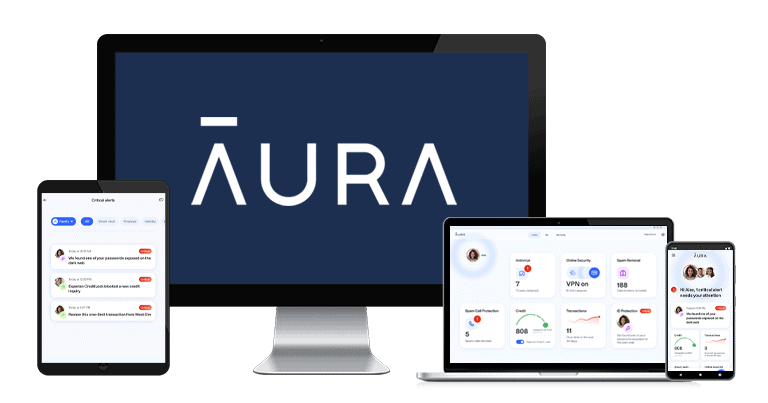
Aura offers a decent antivirus program and top-notch identity theft protection (for US users). It caught the vast majority of malware threats during my testing, but its anti-malware scanner doesn’t offer the same customization options that most other top antivirus competitors provide.
Aura’s wide range of identity theft protection services is really impressive — it monitors bank accounts, credit reports, social security activity (and much more) and will notify you if your identity has been hijacked.
However, Aura’s VPN, parental controls, and password manager aren’t great, and it lacks important features like a firewall, Wi-Fi network monitoring, and system tune-up tools — competitors like Norton and Bitdefender offer all of these essential extras and cost less than Aura. Furthermore, Aura only includes its parental controls on its family plan add-ons.
Aura Plans & Pricing — Expensive Plans (But You Can Cover up to 10 Devices)
Aura offers 3 plans, which all include the same antivirus, VPN, and password manager features. But the more expensive plans offer antivirus and VPN coverage for more devices, and they offer identity theft protections for more users (they also include increased insurance payouts). The Family plan includes basic parental controls, too. Note that Aura is only available in the US and territories (American Samoa, Guam, Northern Mariana Islands, Puerto Rico, and the US Virgin Islands).
Competitors like Norton and Bitdefender offer more features for less money. However, Aura offers coverage on a good number of devices (5 adult users get coverage on the Family plan).
Aura’s annual plans include a 60-day money-back guarantee.
Here’s a summary of Aura’s plans:
| Aura Antivirus | Aura Antivirus Plus | Aura Ultimate | |
| Platforms | Windows, macOS, Android, iOS | Windows, macOS, Android, iOS | Windows, macOS, Android, iOS |
| Price | $35.99 / year | $47.99 / year | $59.99 / year |
| Number of device licenses | 3 | 5 | 10 |
| Malware scanning & removal | ✅ | ✅ | ✅ |
| Real-time protection | ✅ | ✅ | ✅ |
| Ransomware protection | ✅ | ✅ | ✅ |
| Web protections | ✅ | ✅ | ✅ |
| Firewall | ❌ | ❌ | ❌ |
| Password manager | ❌ | ✅ | ✅ |
| VPN | ✅ | ✅ | ✅ |
| Dark web monitoring | ❌ | ✅ | ✅ |
| Encrypted storage | ❌ | ✅ (1 GB) |
✅ (1 GB) |
| US-based resolution support | ❌ | ❌ | ✅ |
| Credit and transaction monitoring | ❌ | ❌ | ✅ |
| ID theft insurance | ❌ | ❌ | ✅ ($1 million) |
Antivirus Plan — Most Affordable Plan With a VPN
Aura’s Antivirus plan provides an antivirus and a VPN. You can use both of these tools on up to 3 devices and it costs $35.99 / year. This is Aura’s most affordable plan, and it’s great that there are no data restrictions on the VPN. It doesn’t include any features to monitor your personal information or protect you from identity theft, however, which I think are Aura’s best features. It also lacks the password manager — which is disappointing. It’s a cheap entry point, but more expensive than Norton Antivirus Plus, which offers 2 GB cloud backup and a password manager.
Antivirus Plus Plan — Aura’s Best-Value Plan
The Antivirus Plus plan ($47.99 / year) adds a password manager and basic tools to protect your identity. Specifically, you can monitor up to 10 pieces of your personal information (like your address, social security number, or phone number). Aura will constantly check to see if anything you add to your vault has been involved in any breaches or posted on the dark web. You can also monitor 10 online accounts in a similar fashion. Finally, the plan adds 2 device licenses and 1 GB of secure cloud storage.
Ultimate Plan — Most Extensive Plan With ID Theft Protection
The Ultimate plan ($59.99 / year) adds extensive identity theft protections. This includes specialist support from US-based experts and up to $1 million in restitution if you’re a victim of identity theft. You also get automatic monitoring of your credit, financial transactions, home title, car title, and criminal records. The level of protection isn’t quite what you get with Norton’s LifeLock plans, but the price is very competitive. You can also upgrade your subscription to a family plan to increase the number of devices and pieces of personal information that will be monitored.
Aura Security Features — Pretty Decent Features Overall
Anti-Malware Scanner — Detects Most Malware (The Real-Time Protection Could Be Better)
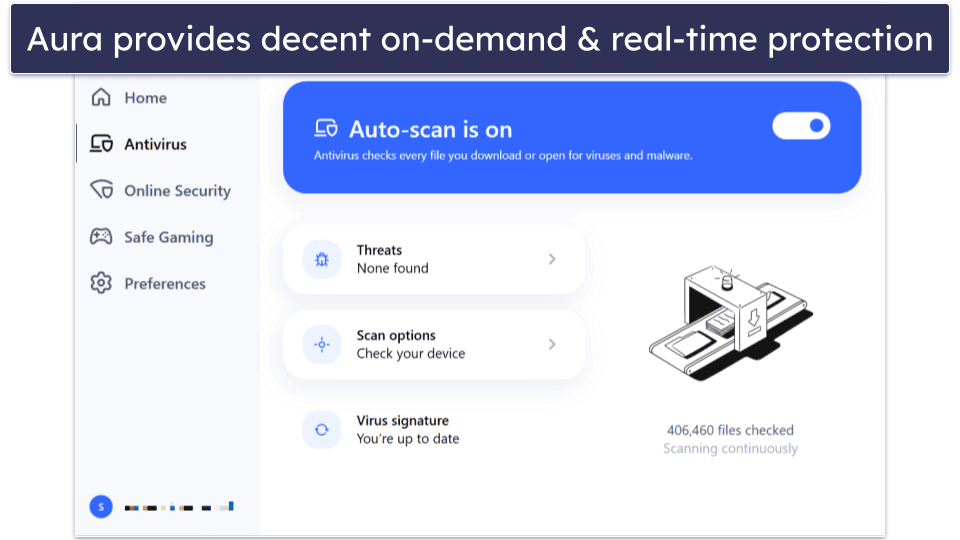
Aura’s malware scanner can detect malware as well as top competitors, and it offers real-time malware detection and on-demand scans. It uses a huge database of known malware and machine learning to identify threats.
Aura offers 3 different methods for manually scanning your computer:
- Quick Scan — Scans folders where viruses and malware are often found, like system files and temporary files.
- Full Scan — Scans every file and folder on your device.
- Custom Scan — Choose specific files or folders to scan.
Aura was able to detect about 98% of the test malware files I downloaded — this is almost as good as the top Windows antiviruses in 2025, which can all detect close to 100% of malware files. The malware samples I downloaded onto my Windows 11 PC to test Aura included spyware, trojans, viruses, and ransomware.
Aura’s on-demand scanner scored similar detection rates on my Mac, but its real-time protection wasn’t very good in my testing (Mac users should check out Intego, which has the best Mac antivirus scanner of 2025).
My main complaint is that you can’t schedule scans ahead of time — Aura’s scanner slowed my computer down somewhat during my tests, so I’d much rather be able to schedule my full disk scans to run while I’m asleep or not using my computer. Aura doesn’t provide scan logs, either, which makes it hard to track security trends and issues on your device (you only get to a see a long list of every file scanned). All of the top antivirus products include scan scheduling and scan logs, so I was pretty annoyed that Aura lacks this basic functionality.
Overall, Aura’s antivirus protection is really good — its malware detection rates are comparable with the best antivirus competitors (although its macOS protections need work). However, I don’t like being unable to schedule scans or access scan logs. But Aura’s antivirus scanner detected the vast majority of malware in my testing, so it’s still a decent choice for anti-malware protection.
Online Security (VPN) — Fast Speeds + Torrenting Support, but You Can’t Choose Your Location
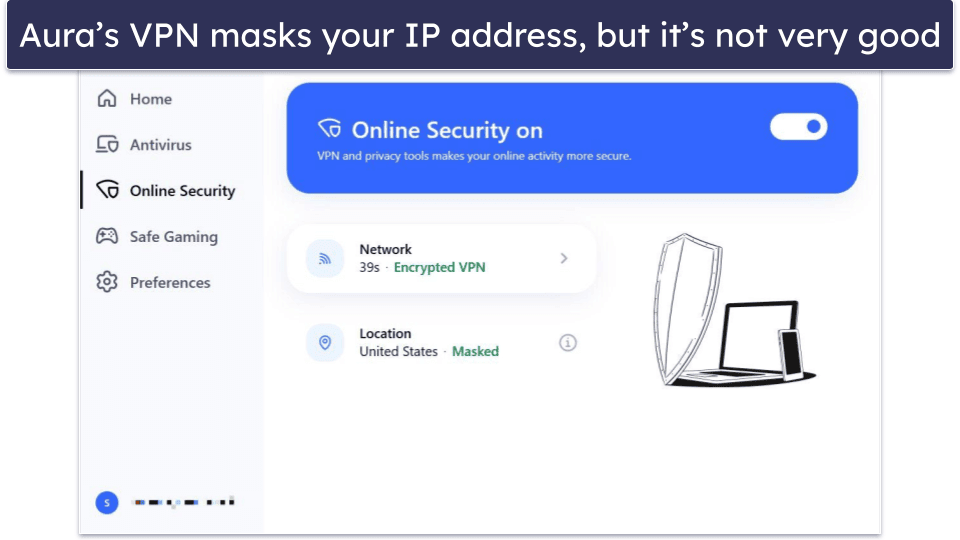
Aura offers a simple VPN for Android, iOS, Mac, and Windows. It’s a decent VPN for encrypting your internet activity and masking your true location, but it’s nowhere near as good as the top VPNs on the market.
It doesn’t give you any options to change your location (Private Internet Access lets you choose between servers in 91 countries) and lacks a kill switch that would protect your data from leaking in case your connection to the VPN server disconnects. These are basic, industry-standard features that all the best VPNs on the market include. That said, I do like how you can automatically enable the VPN whenever you connect to an unsecured network.
Aura is decent but not great when it comes to streaming — it works with Netflix and Amazon Prime, but not with Hulu or Disney+. If you want a really good streaming VPN, check out our top choices for all popular streaming sites here.
While Aura’s VPN allows P2P traffic, I wouldn’t use it for torrenting — without a kill switch, your ISP is likely to detect your torrenting activity if there are any VPN server connection issues. If you’re interested in torrenting, I’d consider ExpresssVPN.
Aura’s VPN also blocks suspicious websites, like those that attempt to phish for your personal data. I tested multiple known phishing links to determine the efficacy of this feature and the VPN detected and blocked some of them, but I was still able to visit several dangerous sites. It’s a good supplement to your browser’s in-built protections, but it’s no stand-in for common sense and caution. It’s just a shame that you need to be connected to the VPN to get this added protection. I wish it were a universal function of the app.
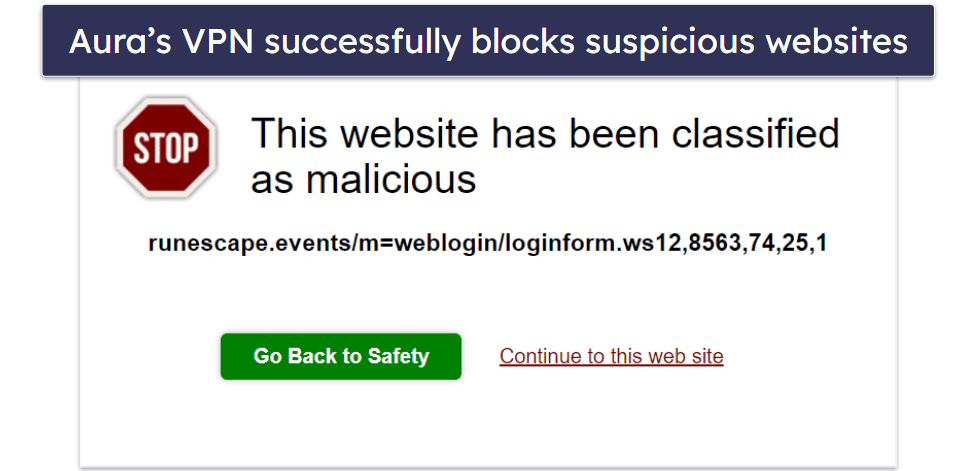
In terms of speed, Aura’s VPN is really good. VPNs route your traffic through an encrypted server before sending it to its destination, which inherently slows the connection speed. But in my tests, Aura’s VPN was incredibly fast, and my connection speed was barely reduced at all.
First I ran a speed test without connecting to the VPN in order to determine my base connection speed. Then I connected the VPN and ran another speed test.
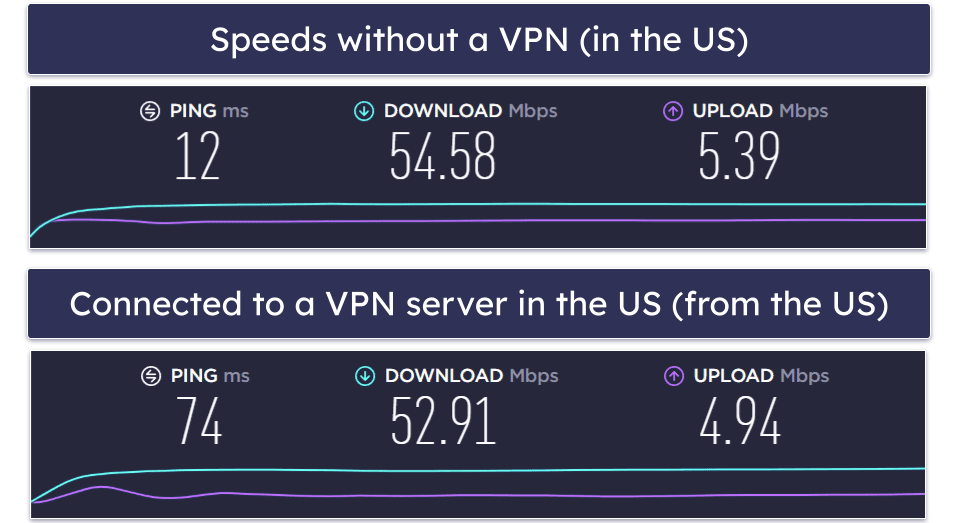
My ping was slower, but my connection speed only decreased by about 3%. I was able to stream 4K videos without buffering and load content-heavy sites like Instagram, which is decent.
Overall, Aura’s VPN is good for encrypting your browsing activity, has fast speeds, and allows torrenting. It does, however, have some major drawbacks, like the inability to change your location, and it’s missing essential security features like a kill switch. If you’re looking for a high-quality and feature-rich VPN, check out our list of the best VPNs in 2025.
Identity Theft Protection — Monitor Tons of Personal Information + Get Help From Live Agents
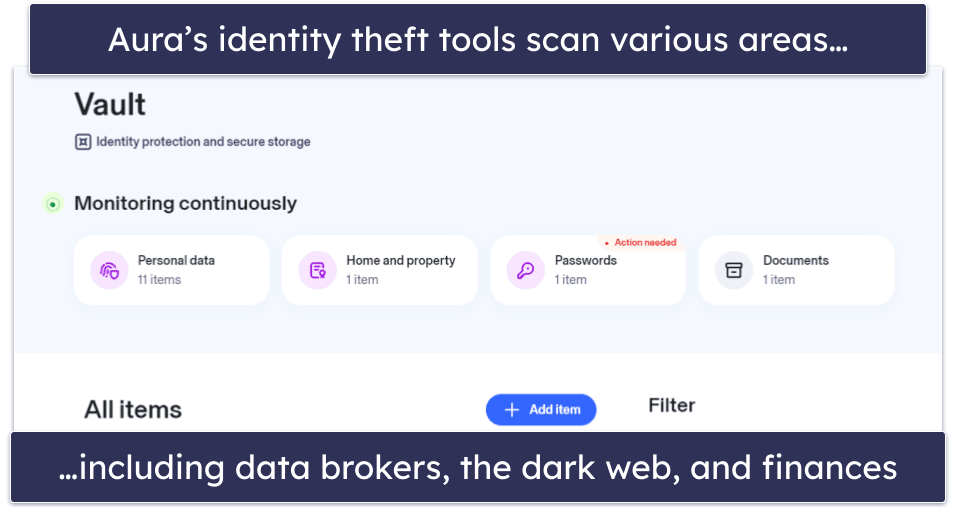
Aura’s suite of identity theft protection services is exceptional — it can monitor your personal information and financial accounts. However, the identity theft protection suite can only be accessed from Aura’s online dashboard, not through the Aura desktop app. The online interface is pretty easy to use, though, so I didn’t find this too inconvenient.
Aura’s ID theft protection includes:
- Credit monitoring and credit reports — Gives monthly reports from a major credit bureau and allows you to lock and unlock your credit file to prevent unwanted inquiries.
- Bank monitoring — Monitors your bank accounts and alerts you to any suspicious spending.
- Data protection — Submits removal requests to data brokers that collect and sell your personal data, protecting you from unwanted advertising and robocalls.
- Dark web monitoring — Monitors dark web websites, forums, and chat rooms and alerts you any time your personal information is exposed.
- Social Security monitoring — Alerts you anytime a new bank, credit, or utility account is opened using your identity.
- Gamertag monitoring — Alerts you if your online handles have been compromised. Aura can only monitor accounts you have registered through Aura’s ID theft dashboard.
- Lost wallet remediation — If you lose your wallet, Aura helps you secure your credit cards, bank accounts, and IDs to help protect against identity theft.
- Home title and address monitoring — Helps protect against someone attempting to steal your home title or filing a change of address to steal your mail.
- Criminal and court record monitoring — Notifies you if your identity is used or mentioned in police, court, or other legal proceedings.
- 401K and investment account monitoring — Monitors the dark web and alerts you if your financial accounts have been exposed.
- Dedicated fraud resolution agents — If you fall victim to fraud, US-based dedicated agents will help you recover your identity and assets.
I really like that Aura’s identity theft protection includes an insurance policy (up to $1 million on the Ultimate plan) to cover expenses incurred from identity theft. The insurance policy only covers expenses within the US, but it includes lost wages, elder, spousal, and child care costs, travel expenses, accountant costs, and legal fees (legal fees must be approved before being covered).
That said, I do have one complaint. Even on the family plans, each adult user can only monitor 10 pieces of personal information in each of the 3 categories: identity, health, and financial. When you add up all of your debit cards, credit cards, bank accounts, and investment portfolios, you may have more than 10 pieces of information you’d like monitored. It’s a shame Aura can’t accommodate that, even on the most expensive plan. It’s easy to quickly change what’s being monitored, but inevitably something will lose out. You just have to decide if that’s a physical address, a phone number, or a social security number (I definitely recommend keeping the last one under Aura’s watchful gaze). Luckily there’s no limit when it comes to protecting passwords.
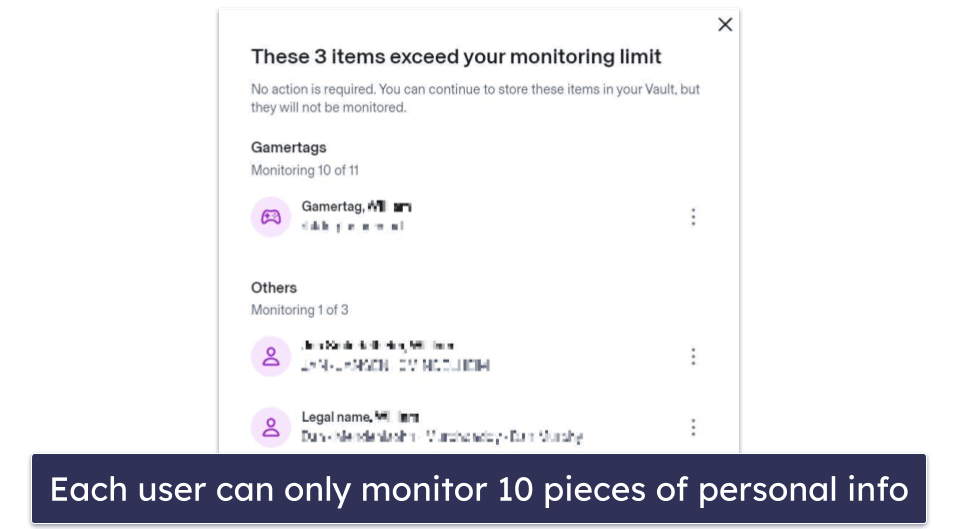
Overall, Aura’s identity theft protection is really good. I like how many types of personal information it monitors, and I appreciate the fact that personal agents will help you recover losses and close your accounts in the event of your information being stolen and used. That said, top competitors like Norton offer a similar level of protection and have less limitations on how much personal information you can monitor.
Password Manager — Basic Password Management Features (Lacking Important Extras)
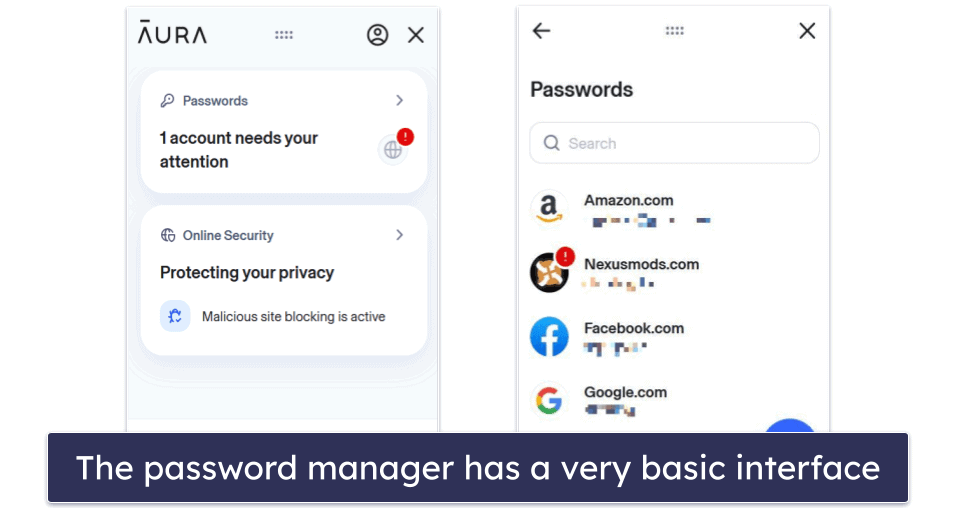
Aura’s password manager has a couple of nice features but is otherwise frustratingly basic — it doesn’t offer the same features or functionality as any of the top standalone password managers in 2025. However, it’s synched up with Aura’s identity protections, which I quite like.
Let’s start with the positives. Any credit card, address, password, username, or other piece of information you add to the identity protection vault will be incorporated into the password manager. So in addition to benefiting from Aura’s dark web monitoring, your passwords and card details will be available as an auto-fill option when using forms on websites.
On that note, the auto-save/auto-fill function works great for passwords and usernames, but it’s a bit lacking when it comes to addresses and credit cards. When entering an address or other saved item that takes up more than one field in a form, you need to click on each individual field, and then the pop-up from Aura for the form to be automatically filled in. With 1Password, you only need to click one field and your entire address is filled in.
I also like Aura’s email alias feature — it allows you to create and use a randomly generated email address for website registrations. This alias forwards emails to your main mailbox, keeping your real email address private. If needed, you can delete the alias to stop mail forwarding. Aura also lets you do this when creating new entries in the vault or editing details for existing services. I love that this feature is included for free (1Password offers something similar, but it’s a paid add-on).
Aura’s password monitoring is straightforward yet effective. Upon logging into Aura’s website, you immediately see real-time monitoring of your passwords in your vault. Aura actively scans for your details on data broker sites, identifying specific brokers who have your information. You’re promptly alerted if your information is compromised, so you can take action. It also has an auditing tool that alerts you to weak passwords even if they weren’t involved in a breach.
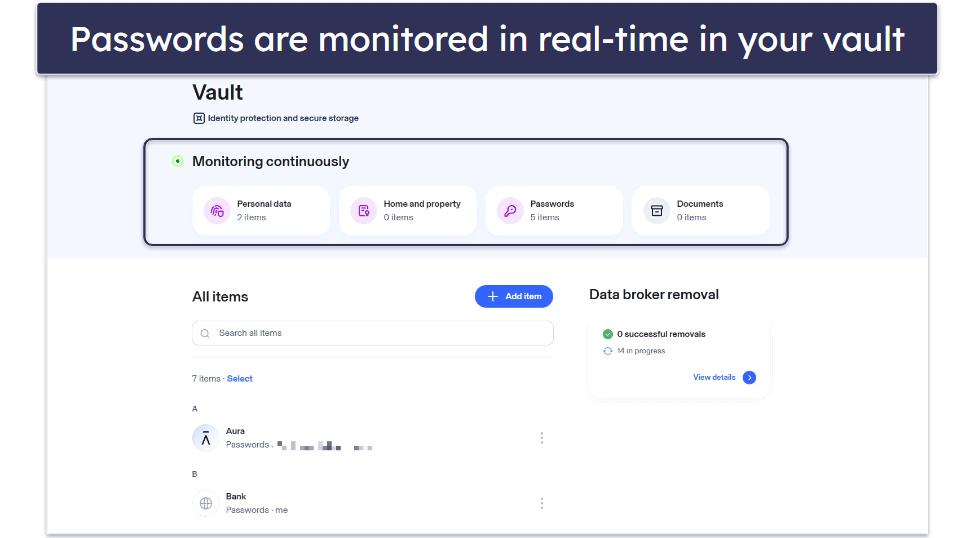
However, the password manager is missing other important features, like biometric logins and advanced 2-factor authentication (2FA) — it also only allows password sharing between users subscribing to the same family plan, too. To unlock the password manager, you need to enter your main Aura password. I wish you could use a separate password for added security. The whole thing could be organized better. For example, I like how 1Password lets you create multiple vaults to make organizing and sharing your passwords easy.
Aura’s password manager is available as a browser extension for all major browsers and is also integrated into the main Android and iOS app. In addition to auto-fill and password auditing, the extension also provides protection against phishing pages and other malicious sites, but this wasn’t very effective in my tests.
Overall, Aura’s password manager is basic but capable. It’s not that feature-rich, but it does the basics pretty well and is integrated with Aura’s dark web monitoring. As a bonus, the email alias feature is a cool extra.
Parental Controls (Family Plans Only) — Great if You Want a Simple Way to Monitor Your Kid’s Activities
Aura’s parental controls are a good choice for those looking for a beginner-friendly app to monitor their children’s online activities on Android and iOS devices. While it doesn’t top the charts as the best antivirus with parental controls, Aura offers a suite of standard features that align with industry expectations for mobile monitoring, albeit with notable gaps in certain areas. Nevertheless, it’s great for large families — you can add up to 50 devices under one subscription. However, to get access to the parental controls, you have to upgrade to a family plan after purchasing any of the standard plans.
With Aura’s parental controls, parents have the ability to:
- Implement web and app filtering with customizable rules for website and app access.
- Manage screen time with specific app time limits.
- Use the Safe Gaming feature to protect children from cyberbullying in over 200 online games.
- Monitor and block apps on both Android and iOS devices.
- Access reports of blocked websites your child attempts to visit.
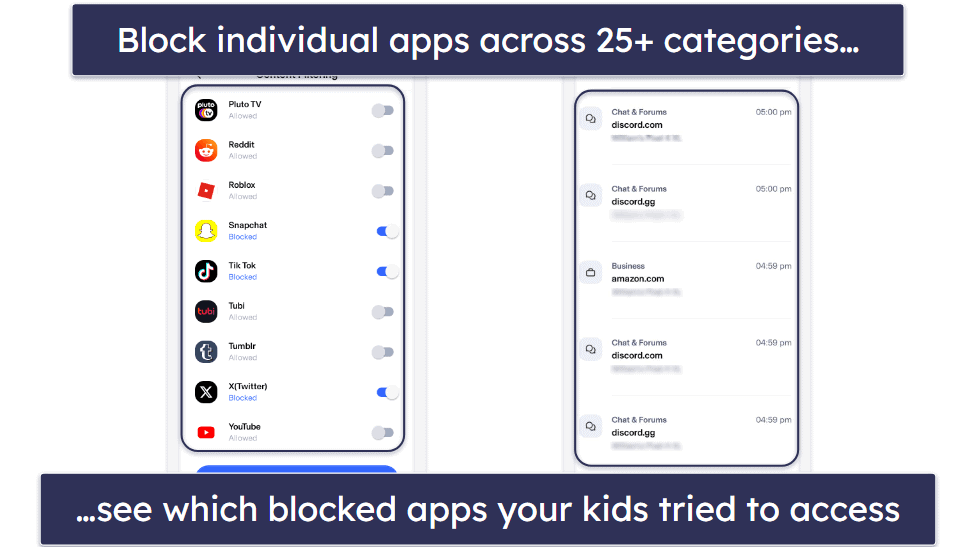
Aura’s content filtering feature is basic but effective. It provides two preset modes tailored for different age groups — Child mode with extensive default restrictions and Teen mode for blocking explicit and mature content. It also offers the flexibility to customize these settings further, blocking content across 25+ categories.
I would like to see Aura include important features like location tracking, uninstall protection, and YouTube monitoring — Qustodio and Norton Family offer all these features.
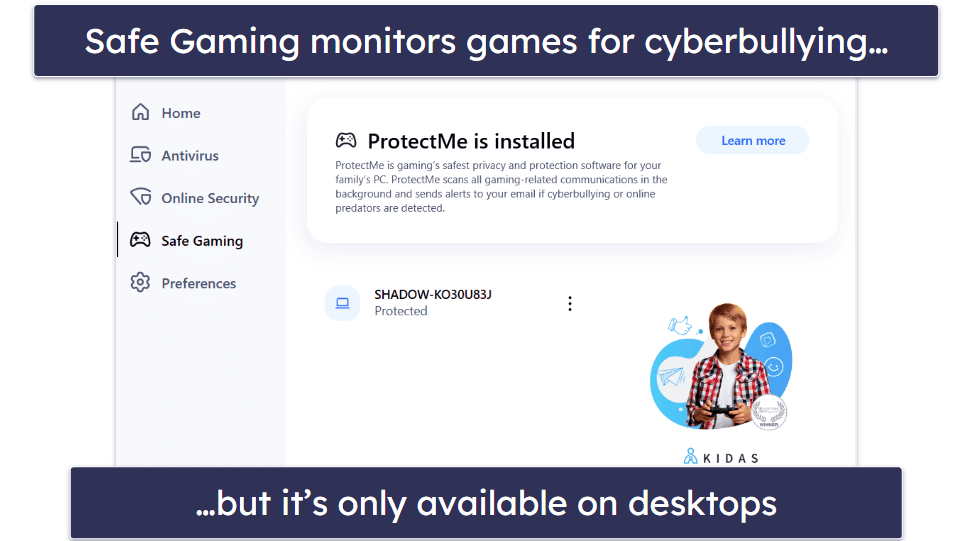
Aura’s Safe Gaming feature helps protect kids while they play online games. It keeps an eye out for things like bullying, mean language, and other harmful behavior that can happen during gaming. This feature will alert you if it spots anything troubling, helping to make sure kids have a fun and safe time while playing games online. While this is a nice feature, I find it very disappointing that it’s the only desktop feature available with the parental controls.
In conclusion, Aura’s parental controls deliver on basic needs and includes some good features like Safe Gaming. However, it doesn’t cater to all parental concerns, particularly if your child is a desktop user or if you’re looking for more advanced controls like location tracking.
Aura Ease of Use & Setup — Good Desktop App (But Little in Terms of Customization)
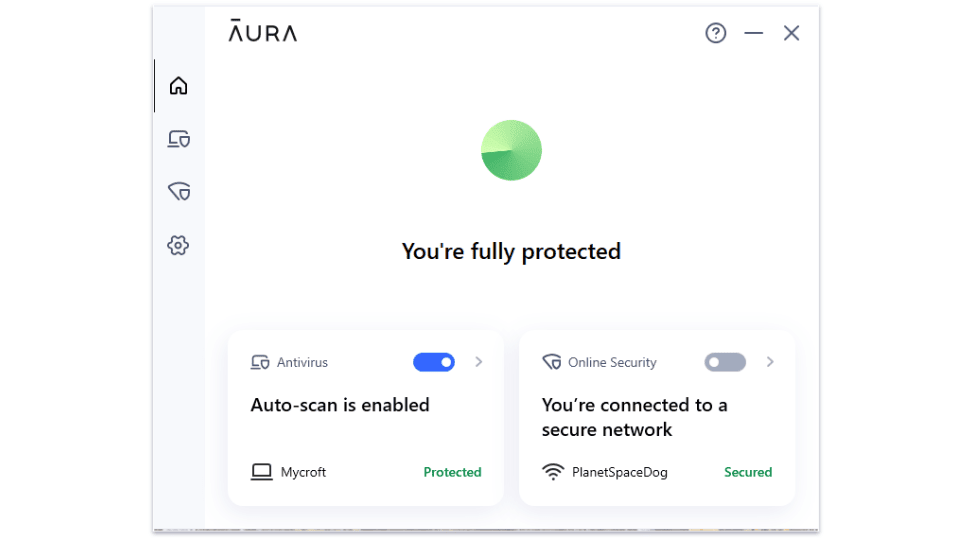
How to Install Aura (Just 3 Simple Steps):
- Purchase an Aura subscription. Choose your plan and enter your payment details. Create a password and your account will be activated. Enter your personal details so that Aura can monitor your identity.
- Install the app. Run the .exe file that begins downloading after your purchase is complete. Follow the instructions as the app installs.
- Get protected. Open the Aura app. You’ll be prompted to initiate your first scan. While the scan is running, return to the browser you used to purchase Aura. You’ll find a tutorial that teaches you how to use the web dashboard and add personal information to your vault.
Aura provides a super minimal app with a clean interface for Windows, macOS, Android, and iOS. Installation and setup only took about 5 minutes on my Windows PC. After logging into my Aura account and navigating to the downloads page, I simply selected my operating system and downloaded the installer. Once installed, Aura automatically started my first full scan, and any time the app updated, it ran another full scan automatically.
Aura has a clean look — you can turn on the VPN and enable real-time malware protection from the home screen. The sidebar on the left side of the screen allows you to access controls for the antivirus scanner, VPN, and Aura’s settings. However, none of Aura’s controls provide a lot of options.
In the antivirus window, you can pick from 3 different scan types, and you can whitelist safe files in the malware scanner’s settings. But that’s about it.
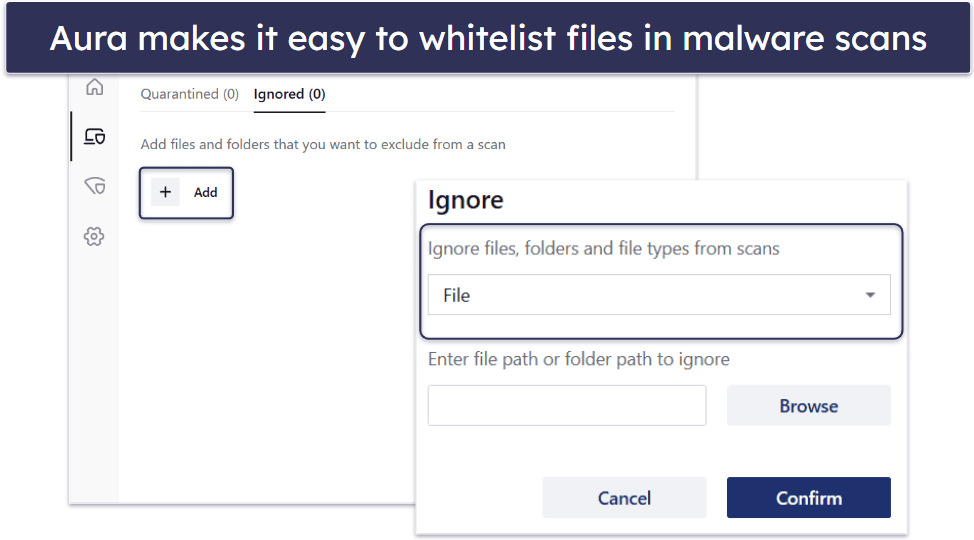
Aura doesn’t let you schedule malware scans, adjust real-time protections, or look at previous scan logs. Competitors like Avira allow you to look through previous scan logs, schedule various malware scans, adjust anti-phishing protections, and much more.
Besides that, the app’s settings are very minimal, allowing you to decide if Aura opens on startup, whether or not Aura can give you notifications, and whether the VPN should automatically connect if your device connects to an unsafe network like a public Wi-Fi hotspot — and that’s it.
Aura’s desktop app doesn’t include the password vault or ID theft protections, and the VPN barely has any customization options. Competitors like Norton and Avira incorporate most of their features in a single intuitive app.
I also had an issue when setting up a family plan. I added a family member to my plan by giving Aura his email address. He received an email from Aura to activate his account, but at the end of the process, the site took him to the checkout page and wouldn’t let him log in. My account was supposed to cover 5 adults, so this was obviously wrong. I had to contact customer support to get this issue resolved.
Overall, Aura’s desktop app is decent, but there’s room for improvement. It’s missing many of the features included with your Aura account, it doesn’t provide many basic customization options, and the app only includes the antivirus and VPN features. However, the interface is intuitive and easy to navigate, and I never had any problems or experienced any glitches during my tests.
Aura Mobile App — Simple Android App, but the iOS App Isn’t Great
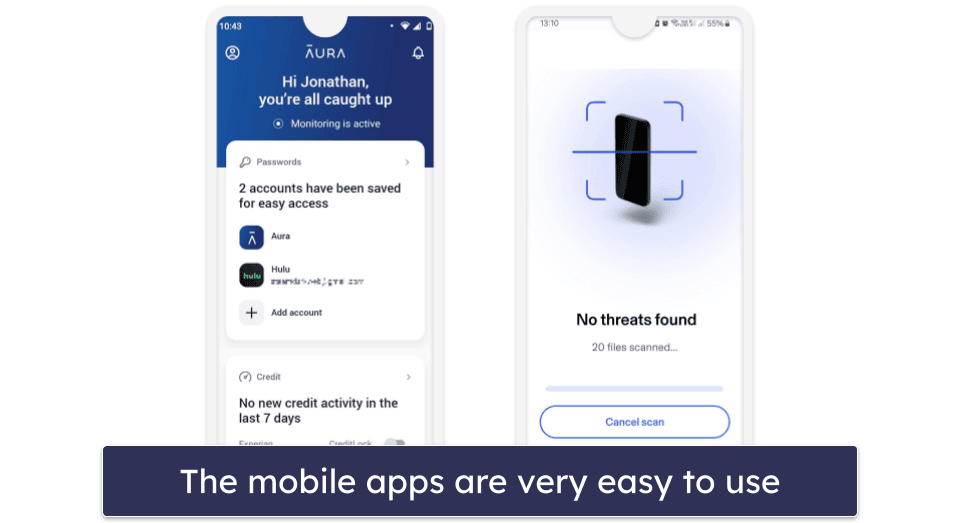
Aura’s mobile app is very simple and easy to use, but it isn’t as good as top competitors like Norton and McAfee. The iPhone app includes the password manager, VPN, and a fully functional mobile version of the vault where you can add items to benefit from Aura’s dark web monitoring. The Android app has all these elements, plus an antivirus scanner.
The Android antivirus scanner is incredibly easy to use because of its simplicity. It’s a simple malware scanner with no additional features. You can press the big scan button on the main screen to start a manual scan of all the files on your smartphone, and you don’t have any other options.
Scanning my Android phone only took about 10 minutes, and it detected almost all of the files I downloaded to test its mobile scan. This is a decent malware detection rating, but not as good as the 100% malware detection scores achieved by competitors like Norton and Bitdefender.
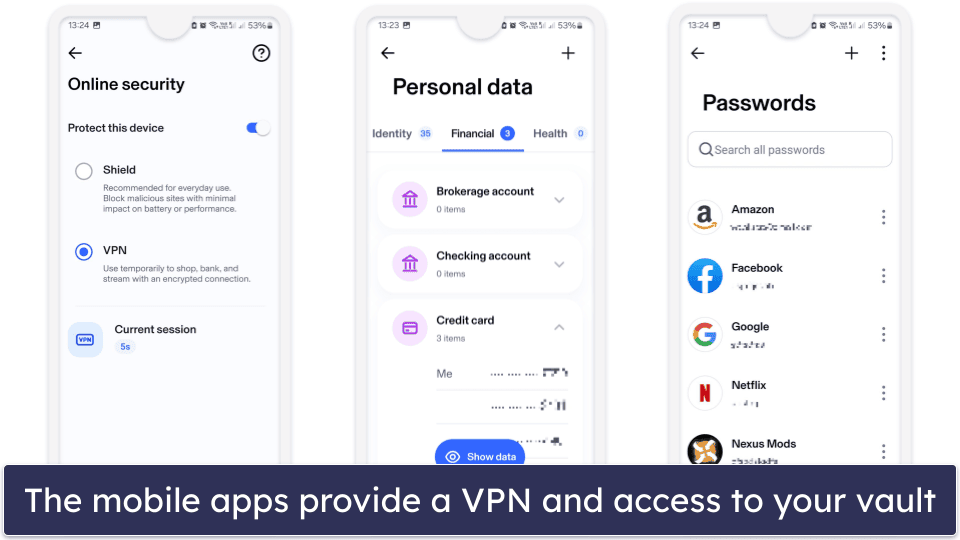
- Password manager. Very minimal password manager that’s missing a lot of features offered by the top standalone password managers.
- Identity theft protections. Aura offers a wide range of identity and financial protections for US users, including credit, bank, and investment account monitoring, data protection, dark web monitoring, social security monitoring, and more.
- Call protection. Effective call screener that blocks most spam and scam calls (paid add-on).
- Wi-Fi security (VPN). Simple VPN that is able to block malicious websites and malware. Unfortunately, it’s missing basic VPN features like being able to choose a server to connect to, and it doesn’t include a kill switch.
- Parental controls. Basic but user-friendly parental controls that filter and block content and manage screen time (Family plans only).
It would be nice to see Aura include additional features like app scanning, privacy monitoring, an app analyzer, and anti-theft tools (which all of the best Android antivirus apps provide).
Aura’s iOS offering is minimal, so I recommend iOS users check out our list of the best antiviruses for iPhones and iPads — the best iOS security apps like Norton and TotalAV provide additional features like SMS scam filters, location tracking, secure browsers, and more.
However, Aura is a decent choice for Android users looking for a super simple antivirus scanner and nice extras, like easy access to Aura’s vault.
Aura Customer Support — Live Chat, Phone Support, a Knowledge Base & More
Aura offers customer support via phone, live chat, email, knowledge base, and FAQs. I had good experiences with the live chat and phone support, both of which are available 24 hours per day, but only in English.
Each time I contacted email support, it took almost a day to get a response. When I did get a reply, it simply said to call phone support. This is unacceptable, and I would expect to be able to use email support instead of being forced to call the phone line every time I have a simple question about the service. Top competitors like Norton and McAfee have support teams that reply to email requests within a few hours, and they actually answer user questions.
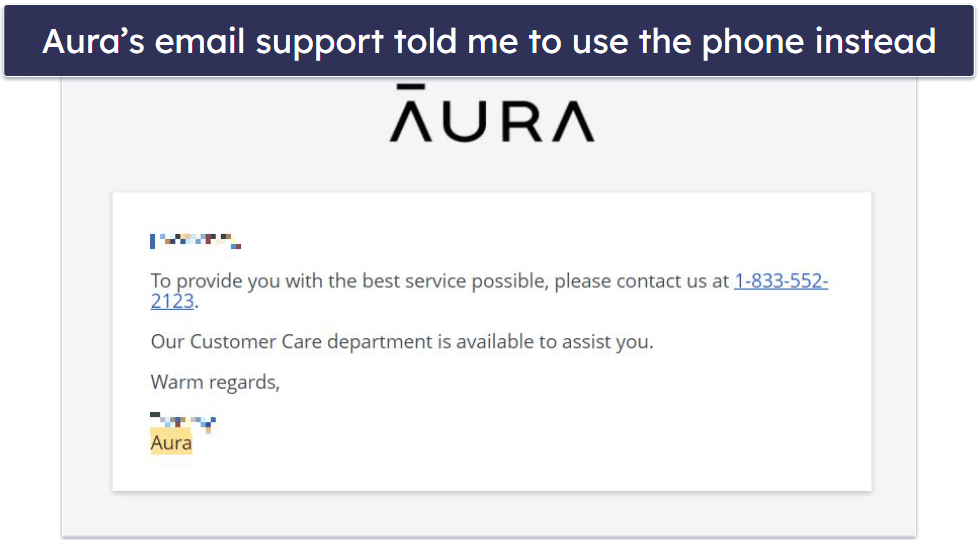
The phone support agents I talked to were all friendly and knowledgeable. I was really happy that I didn’t have to wait a long time to connect to a rep, no matter when I made the call. When I had an issue adding someone to my account I had to wait on hold for a while, but when the agent came back, he informed me that a new link had been sent to my family member who was then able to create an account.
The same was true of live chat. I got swift answers to questions I had about various features that weren’t described in depth on the website. The representative was able to explain exactly what they did, leaving me satisfied. He did say that a few of my questions would need to be answered by a phone support operator, but this isn’t unusual.
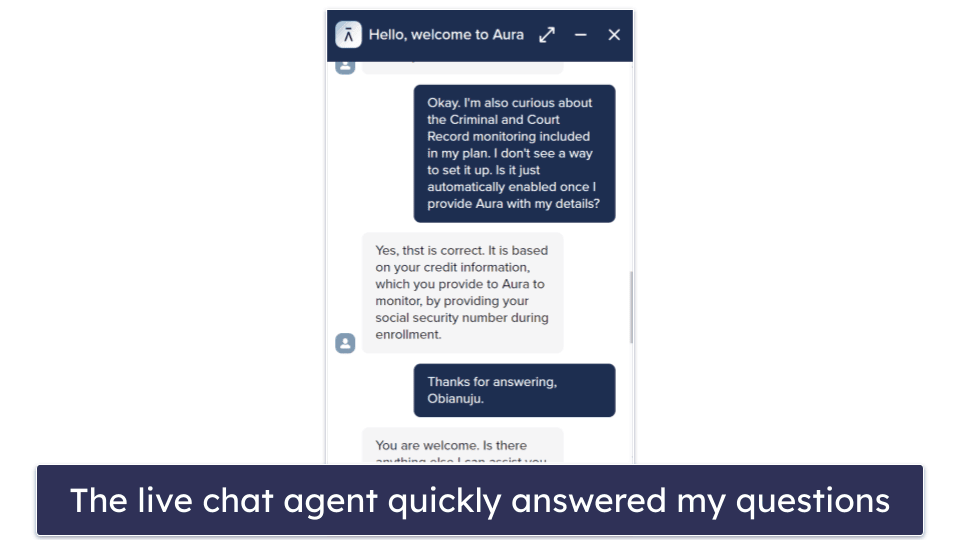
The FAQ page Aura offers has a blend of simple and detailed responses. Nonetheless, it’s somewhat inferior to Norton’s extensive FAQ page, which includes useful video guides and even a vibrant community forum.
The 24/7 phone support from Aura is great, as is live chat. The email support is almost negligible, unfortunately. While Aura’s FAQ can be useful for answering basic queries, it lacks video instructions or user forums, unlike its top competitors. Nonetheless, English-speaking users of Aura will appreciate the availability of live phone support round the clock.
Is Aura Worth the Cost?
It depends what you’re after. Aura’s powerful antivirus scanner and excellent identity theft protections are definitely a good value, but its VPN, parental controls, and password manager aren’t great, and it’s missing many of the features included with the top antivirus suites in 2025.
Aura’s antivirus offers a nearly perfect malware-detection rate and uses a huge database of known threats — it ranks with advanced competitors like Norton and Bitdefender.
Aura’s identity theft protections are also very good. They scan credit reports, dark web sources, court proceedings, bank statements, and much more to immediately notify users if any of their personal information is being used without their consent. Norton LifeLock provides a similar set of protections.
However, Aura has some major drawbacks that I can’t ignore. Its password manager is just ok, its VPN is pretty basic (it lacks a kill switch and doesn’t let you pick your server), and it’s missing important features like a firewall, Wi-Fi network protection, and convenient antivirus scan scheduling tools. In addition, the parental controls are basic and only available on its most expensive plan.
The Antivirus Plus plan includes basic identity monitoring tools. If you want extensive protection like identity theft insurance, credit monitoring and more, you’ll need to get the Ultimate plan.
All of the annual plans come with a 60-day money-back guarantee though, so you can try them risk-free.
Frequently Asked Questions
Is there a free version of Aura?
No, Aura doesn’t provide a free version of any of its services or apps, but it does have a 60-day money-back guarantee for the annual plans, which gives you plenty of time to try it and see if it’s right for you.
Aura has a number of tiered plans offering different levels of identity and credit monitoring, as well as parental controls in the Family plan. All of Aura’s paid plans include the antivirus feature as well as Aura’s VPN and password manager.
Is Aura a good antivirus?
Aura’s anti-malware scanner is good at detecting viruses, trojans, and more, but it’s not as good as the top antiviruses in 2025 — using its huge database of known threats, Aura was able to detect around 98% of the test files I used. This is pretty good, but top antiviruses like Norton 360 have perfect detection rates, include more features, and offer a better value.
Does Aura’s antivirus work for Android and iOS devices?
Aura offers a basic antivirus scanner for Android and an online security app including the VPN, password manager, parental controls, a spam call screener, and ID theft protections for both Android and iOS.
If you’re looking for more comprehensive mobile security, Norton offers the best mobile apps for Android and iOS in 2025.
Will Aura slow down my device?
Maybe, but only during full-disk antivirus scans. I had some slowdown while watching HD YouTube videos during a full disk scan, but other than that, my devices ran perfectly well with Aura installed. Only cloud-based antivirus programs like Bitdefender can run a full disk scan without any system slowdown. Aura doesn’t provide any system cleanup tools, and there are way better options for gamers who want an unobtrusive antivirus option.


